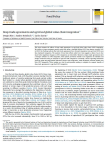Kim D., Steinbach S., Zurita C. (2024). Deep trade agreements and agri-food global value chain integration. Food policy, 01/08/2024, vol. 127, p. 102686.
https://doi.org/10.1016/j.foodpol.2024.102686
https://doi.org/10.1016/j.foodpol.2024.102686
| Titre : | Deep trade agreements and agri-food global value chain integration (2024) |
| Auteurs : | D. Kim ; S. Steinbach ; C. Zurita |
| Type de document : | Article |
| Dans : | Food policy (vol. 127, August 2024) |
| Article en page(s) : | p. 102686 |
| Langues : | Anglais |
| Langues du résumé : | Anglais |
| Catégories : |
Catégories principales 11 - COMMERCE ; 11.3 - Commerce Extérieur et InternationalThésaurus IAMM COMMERCE AGRICOLE ; SYSTEME AGROALIMENTAIRE ; SECTEUR AGROINDUSTRIEL ; ACCORD COMMERCIAL ; CHAINE DE VALEUR ; MONDE |
| Résumé : | This paper assesses the effects of deep trade agreements on agri-food global value chain (GVC) integration. We employ a theory-consistent gravity model and utilize a detailed bilateral GVC flow dataset covering 1991 to 2020. Our findings indicate that such trade agreements favor forward integration into agri-food GVCs more than backward integration. The analysis of how these effects unfold over time suggests a delay of up to four years before significant changes in GVC integration are observable. Moreover, deeper trade agreements exert a stronger influence on GVC integration, with specific provisions related to the regulation of standards and foreign investment acting as catalysts for agri-food GVC integration. Conversely, clauses regarding intellectual property rights and geographical indicators obstruct GVC integration, while developed countries benefit most from GVC integration. These insights are vital for policymakers seeking to mitigate the unequal benefits of deep trade agreements in agri-food GVC integration. |
| Cote : | Réservé lecteur CIHEAM |
| URL / DOI : | https://doi.org/10.1016/j.foodpol.2024.102686 |







